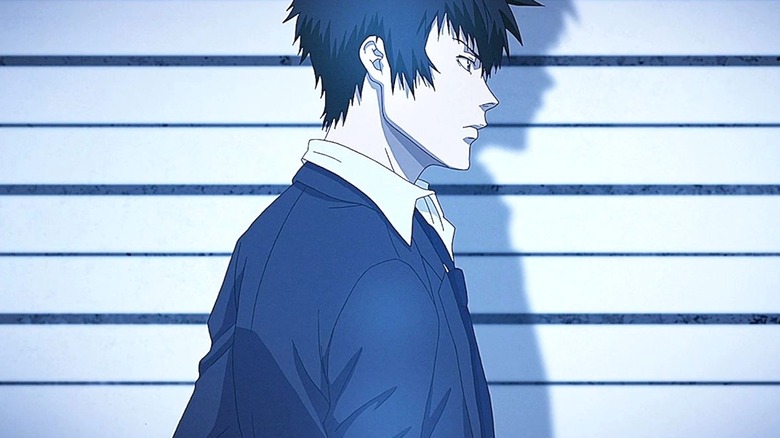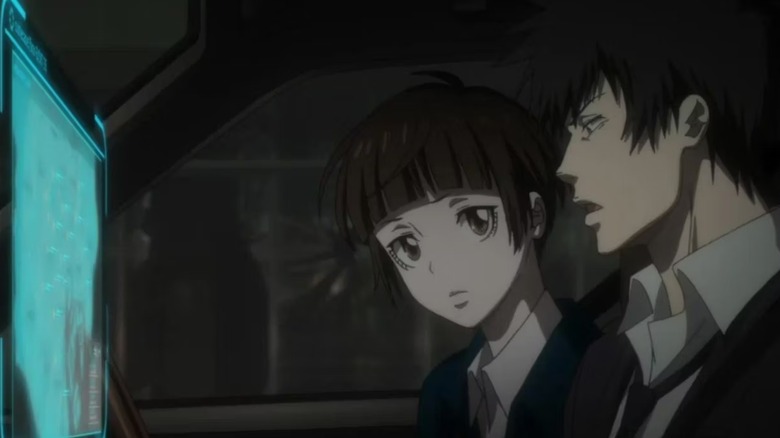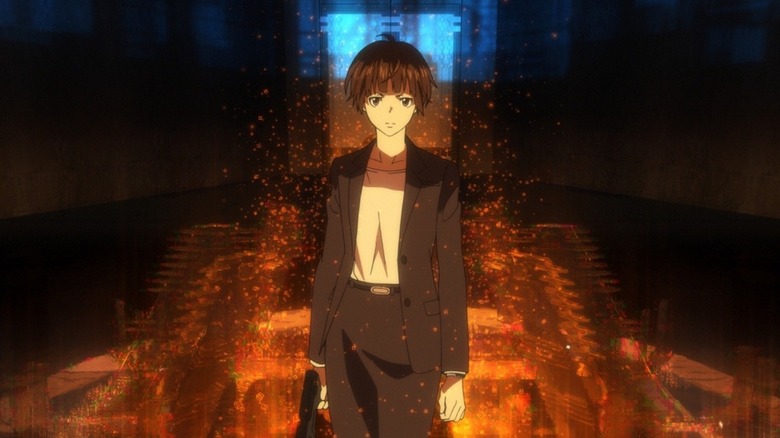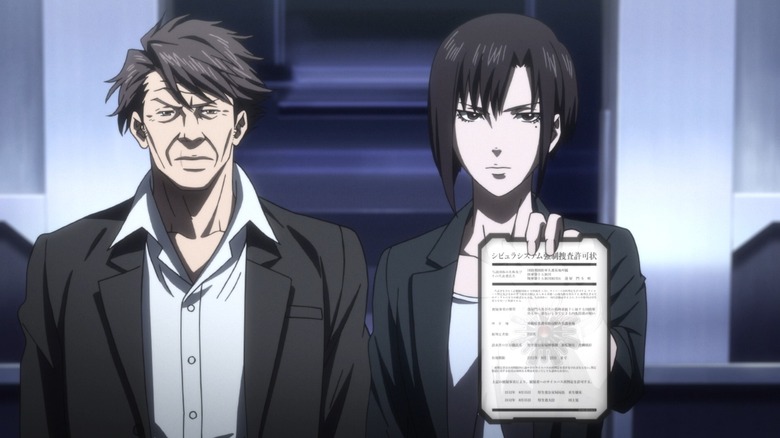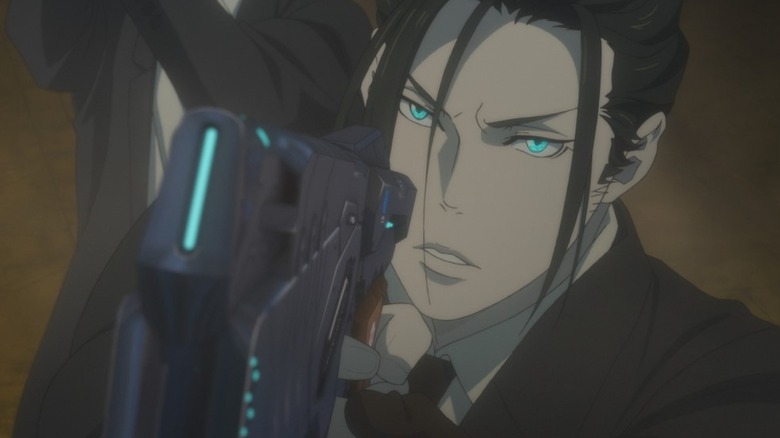The Correct Order To Watch Psycho-Pass
This post contains spoilers for the "Psycho-Pass" franchise.
In a society equipped to prevent crime, can morality be measured or anticipated? Is every individual capable of adhering to an established threshold, and should people be indiscriminately punished for such transgressions? Naoyoshi Shiotani and Katsuyuki Motohiro's "Psycho-Pass" grapples with these pertinent questions by filtering events through a futuristic, cyberpunk setting where humanity is governed by the Sibyl System. Is Sybil, like the name suggests, an all-knowing psychic entity or perhaps a group of capable individuals making informed decisions on a case-by-case basis? Unfortunately, the answer is no: Sybil is a biomechatronic computer network that constantly scans the citizens of this dystopian nation, assessing the potential of a person indulging in criminality.
This psychological report — dubbed PSYCHO-PASS — includes a numeric indicator called a Crime Coefficient (CC), with the accepted threshold being 100. If someone's Crime Coefficient exceeds 100, they're either apprehended or killed on the spot with the aid of field officers and experts from the Crime Investigation Department, who make the difficult decision to evaluate the targets since the Crime Coefficient tends to fluctuate. Although the system seems to function effectively at first, continued enforcement reveals several moral conundrums. If fluctuating CCs are whim or emotion-based, is it fair to pursue targets without any room for nuance? What about crimes committed in self-defense in response to premeditated murder or assault?
"Psycho-Pass" dabbles in these gray areas and more, pushing us to ponder questions about state surveillance, privacy, flawed systems, and the oscillating pendulum of morality. The franchise can be tricky to navigate at first; the companion films are as integral to the premise as the anime, which calls for a watch order that will allow you to experience "Psycho-Pass" like a complicated yet enthralling puzzle.
The only watch order you'll need for Psycho-Pass
There's no harm done if you wish to dive into events in order of the timeline, which starts with "Case. 2 First Guardian," the second film in the "Psycho-Pass: Sinners of the System" movie trilogy, but that would only make matters complicated. To make the best out of the franchise's convoluted worldbuilding, start with 2012's "Psycho-Pass," and watch season 1 in its entirety. This is the season that situates us in the shoes of rookie Inspector Akane Tsunemori, who has to work closely with Enforcer Shinya Kogami on her first mission.
For better context, it's important to understand the difference between Enforcers and Inspectors since they often work in tandem to evaluate the targets chosen by Sybil. Inspectors are elite officers who investigate crime scenes or evaluate suspects, while Enforcers are skilled officers (labeled as latent criminals by the system) who make sure that the Inspectors do not cross the 100 CC threshold. As you can guess, this means that Sybil recognizes that anyone can succumb to latent criminality and actively incorporates this aspect to keep the system functioning.
As Tsunemori is not accustomed to the moral conundrums of the job, the case throws some serious curveballs at her, but she successfully makes a judgment call that prevents an innocent from being killed. The first season is exhilarating, as it navigates the arbitrary nature of the Sybil system, along with the close link between personal judgment and state-endorsed violence, as both Enforcers and Inspectors can fire Dominator guns that only function once the system gives them the green light to shoot after scanning the target's CC and threat level. A fatal systemic flaw is revealed once the unit uncovers the crimes of a criminal mastermind whose CC is bafflingly low, despite his proven criminality. More characters are introduced and fleshed out, providing a solid foundation for a world steeped in flawed estimates.
The Psycho-Pass anime and movie are deeply intertwined
Once you're done with season 1, move over to the second season, where Tsunemori is now leading Unit One alongside other Inspectors and Enforcers, including Mika Shimotsuki, Sakuya Togane, and Sho Hinakawa. Another elusive criminal mastermind thread is explored here, where Kirito Kamui actively wishes to use the system's flaws to evade punishment and make the AI question its own directives. As CCs are integral to Sybil, Kamui finds a way to keep a person's CC low enough to not trigger the threshold, allowing him to circumvent the law with his followers as Dominators cannot be used to kill him. Tsunemori must act in a way that outsmarts both Kamui and Sybil, as she must bring the truth to light before it is too late.
With people like Kamui running around doing crimes undetected, while innocents with clouded CCs are cleared to be killed by a Dominator, "Psycho-Pass" delves into the high price of living in a society that predicts crime to promote a broken idea of peace. Several arcs repeatedly drill in the idea that Sybil's arbitrary notions of justice and order are often the reason that contributes to a person's high stress levels and clouded CC, causing their levels to spike. This is further explored in "Psycho-Pass: The Movie," which is the next destination in our watch order: here, Tsunemori and her team need to combat terrorists from a superstate, which is also employing PSYCHO-PASS to punish latent criminals. Tsunemori and Kogami's fates collide again, and they must get to the root of the conspiracy while collaborating with unlikely parties.
The notion of utilitarianism, which is at the core of the series, is best explored in this film, as it is a school of thought that believes that any action that promotes the greater good (even if it brings about doom on some level) is the morally correct path to follow. Any threats to the system, even if they are justified, are curbed without discrimination, and anyone leading such a cause is labeled as a criminal and purged. However, take Sybil away and the city will immediately plunge into chaos, as the average citizen has already developed an unhealthy reliance on it, to the point that they might not bother to act according to their morality.
Psycho-Pass: Sinners of the System is a must-watch
Next, we have a trilogy of "Psycho-Pass" films under "Sinners of the System" that function as three different cases, and you can watch them in the order of release. The first entry, "Crime and Punishment," focuses on Enforcer Ginoza and Inspector Shimotsuki, who find a traumatized woman who seems to have been injected with a mind-altering drug. Tsunemori takes the case, which leads her back to an experimental prison that has figured out a way to keep CCs low while promoting harmony among the latent criminals. However, things aren't as pristine as they seem, exposing more reasons why Sybil is not to be trusted and is definitely not an unbiased party when it comes to enforcing the law.
"First Guardian" tells the story of Enforcer Teppei Sugo, who used to be a respected military officer before his CC spiked. We come to understand why he became an Enforcer after his squad suffered major losses following a military strike outside Japan. He loses his squad mate and friend, Itsuki Otomo, and this triggers a chain of events that unravels a massive conspiracy, prompting him to take up the mantle of Enforcer.
The third film, "On the Other Side of Love and Hate," brings us back to Kogami, who is now working as a freelance mercenary, but his actions are always motivated by the need to save innocents. In the course of his journey to the Tibet-Himalaya region, he gets involved in a revenge plot, and this prompts him to reflect on his past in Japan while he collaborates with Frederica Hanashiro, who helps him return to his homeland.
While these stories fluctuate in terms of intrigue and thematic depth, the trilogy further underlines the hidden aspects of Sybil and sheds light on returning characters, and what makes them tick.
The utter brilliance of Psycho-Pass: Providence
The next stop is "Psycho-Pass: Providence," which acts as a bridge between seasons 2 and 3 of the anime but emerges as a turning point for Tsunemori, raising the stakes higher than ever. She is even more critical of Sybil than before, especially with Kogami's return after committing a "crime," and the two reconnect while mulling over what has come to pass. The film presents a vibrant antagonist in the form of Kai/Akira, whose inner conflict is verbalized through stunning fight sequences and profound monologues that leave us questioning the integrity of the whole justice system. Deeper questions are asked: Are broken moral codes worth rehabilitation? Is every act of violence committed an indicator of moral failing, or are some actions justified within specific contexts? Where will people failed by the system go, and can they be blamed if they truly turn to crime, as reaffirmed by their labeled CC and threat hue?
The necessity of "Providence" is made clear once you move on to season 3 of the anime, which maps the aftermath of Tsunemori's actions in the film, leading to a reconstruction of The Public Safety Bureau. The introduction of new characters allows fresh facets of the story to emerge, with themes like immigration and genetic manipulation being explored in relation to the core premise. None of the new characters, like Arata Shindo or Kei Mikhail Ignatov, feel lacking when compared to their established predecessors, and the plot focuses on a web of connected cases to underline the urgency of rot that plagues this world.
The series ends on a cliffhanger, but it is resolved in "Psycho-Pass 3: First Inspector," which is the final entry that you need to check out in the franchise. Here, we delve into Shindo and Ignatov's backstories at length, and the nuances are handled pretty well with the presence of a compelling antagonist who questions their preconceived notions about their duties as officers.
Now that you're armed with a solid watch order, it is time to immerse yourselves in the unpredictable, intense world of "Psycho-Pass," and the scores of vibrant, broken souls who fight every day, just for the right to exist.
